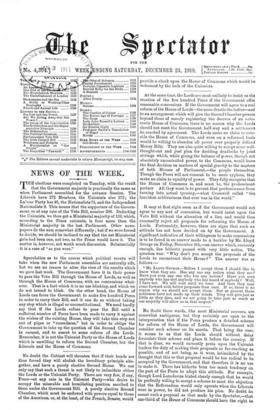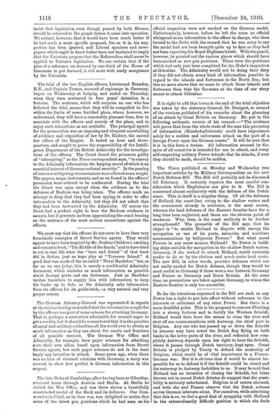No doubt these words, like most Ministerial answers, are somewhat
ambiguous, but they certainly are open to the interpretation that if the Peers produce a detailed scheme for reform of the House of Lords, the Government will consider such scheme on its merits. That being the case, it seems to us that the Lords should without delay formulate their scheme and place it before the country. If that is done, we would earnestly press upon the Unionist leaders the duty of making their proposals as far-reaching as possible, and of not being, as it were, intimidated by the thought that this or that proposal would be too radical to be accepted by the Government, and that therefore it is no use to make it. There has hitherto been too much tendency on the part of the Peers to adopt this attitude. For example, though Lord Lansdowne hinted clearly enough that he would be perfectly willing to accept a scheme to meet the objection that the Referendum would only operate when the Liberals were in power, he did not produce his plan. No doubt he meant such a proposal as that made by the Spectator,—that one-third of the House of Commons should have the right to insist that legislation, even though passed by both Houses, should be referred to the people before it came into operation. We submit, however, that it would have been much better if he had made a more specific proposal, for, as it is, his sug- gestion has been ignored, and Liberal speakers and news- papers which ought to know better have not hesitated to imply that the Unionists propose that the Referendum shall never be applied to Unionist legislation. We are certain that if the plan of a reference on demand by one-third of the House of Commons is pat forward, it will meet with ready acceptance by the Unionists.







































